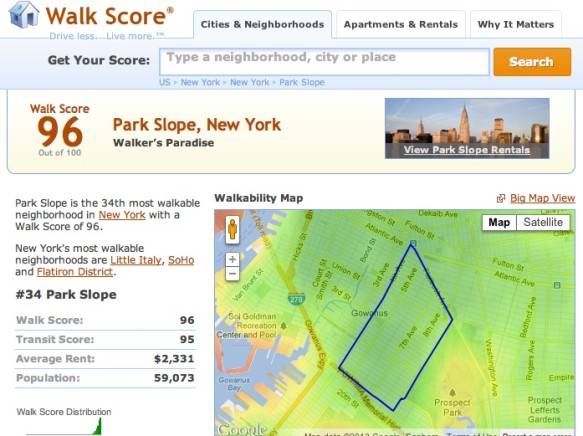Walkscore.com Helps Locate Your Walkable Future Home
If you want to know the best places to live for simplifying and editing your life, check out walkscore.com. The site evaluates locations around the country for their walkability, using a scale of 0-100.
What’s unique about the site is that it breaks down scores by neighborhood, which often have very different profiles than their cities. The site lists average rents and other important demographic info to get the full picture of a place. This detailed information allows visitors to make highly informed decisions when comparing different locations. For example, I live in “walker’s paradise” of Park Slope, Brooklyn, which has a score of 96; but the average rent in my neighborhood is a discomfiting $2300. I can compare that to Minneapolis, whose overall walking score is a paltry 69, but whose Downtown West area is a competitive 91 with average rents of $1500. Hmmm…
Walkscore is mostly a real estate search engine, where you can look for properties based on your desired commute time. The site shows a Google-map highlighting all of the amenities in an area, including LifeEdited staples like car-sharing garages (info valuable for anyone). There are several other filters which allow you to find your ideal spot; for example, you could say you want to be within 10 mins of a swimming pool. The site finds the pool and all of the properties within walking distance of it.
Here are few other compelling benefits the site lists for choosing a walkable area:
- Health: The average resident of a walkable neighborhood weighs 6-10 pounds less than someone who lives in a sprawling neighborhood.
- Cities with good public transit and access to amenities promote happiness [citation].
- Environment: 82% of CO2 emissions are from burning fossil fuels. Your feet are zero-pollution transportation machines.
- Finances: Cars are the second largest household expense in the U.S. One point of Walk Score is worth up to $3,000 of value for your property.
- Communities: Studies show that for every 10 minutes a person spends in a daily car commute, time spent in community activities falls by 10%
Have you used Walkscore.com? If so, let us know what you think or if there are other resources we should know about.
Thanks for the tip @noncellulose





